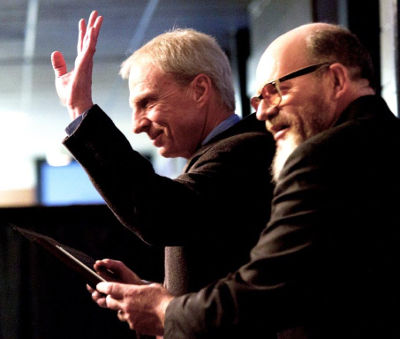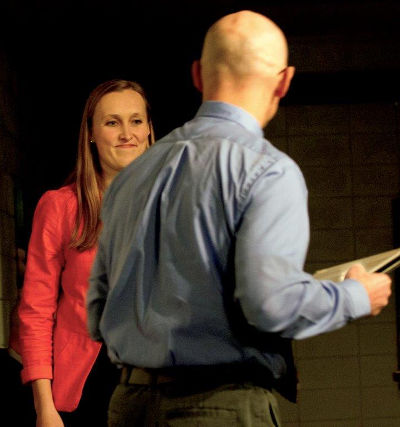

Lakeland College today announced a number of significant changes, which include renaming the institution Lakeland University and changing its academic structure beginning on July 1.
Two new majors and several academic program enhancements are part of the announcement.
They're the most significant changes announced by the school since Lakeland College was created in 1956, said Dan Eck, the institution's president. Lakeland was founded as Mission House College and Seminary in 1862.
"As we mark the 60th anniversary of a major milestone in this institution's history, we're announcing a number of changes that will position Lakeland as a leader in higher education for decades to come," Eck said. "This is more than just a name change. We are responding to student and employer needs and the wave of developments impacting higher education."
The new academic structure merges the college's existing seven academic divisions into three schools – a School of Business & Entrepreneurship; a School of Science, Technology & Education; and a School of Humanities and Fine Arts.
Meg Albrinck has been named Lakeland University's provost, and will be responsible for oversight of all of Lakeland's academic programs. A member of the Lakeland community for 17 years, she has served as the college's vice president for academic affairs and dean of the college since 2008. She also holds the title of professor of literature and writing.
Each school will be led by a dean. Brian Frink, professor of chemistry and physics, has been named dean of the School of Science, Technology & Education. Scott Niederjohn, Charlotte and Walter Kohler Charitable Trust Professor of Business Administration, has been named dean of the School of Business & Entrepreneurship. The dean for the third school has yet to be named.
The School of Science, Technology & Education will house Lakeland's undergraduate majors and minors in aviation, biology, biochemistry, chemistry, criminal justice, computer science, education, exercise science, mathematics, psychology and sport management and leadership and the master of arts in counseling and master of education programs.
The School of Business & Entrepreneurship will house Lakeland's undergraduate programs in business, including accounting, business administration, economics, hospitality management, marketing and specialized administration, and the master of business administration.
The School of Humanities and Fine Arts will house Lakeland's undergraduate majors and minors in art, broad field social studies, communication, English, history, music, religion, Spanish and writing.
Lakeland also announced a number of academic program additions and enhancements, changes that stem from ongoing program assessment that includes feedback from employers and students:
- Creation of a five-year bachelor's degree/MBA track for highly motivated, goal-oriented students interested in earning both degrees in a shorter timeframe. "For students interested in positions where an advanced degree is desired, this is a great option," Niederjohn said.
- Creation of a management information systems bachelor's degree, which is pending approval by the Higher Learning Commission. It combines coursework from Lakeland's existing business administration and computer science majors for students looking for leadership roles in technology fields after graduation. "Jobs requiring an MIS degree are frequently ranked at the top of job outlook surveys," Niederjohn said.
- Expansion of the marketing major with the addition of four emphasis areas: sales management, retail management, digital marketing and graphic arts.
- Additional real-world experiences for the hospitality management program. Students seeking jobs in hospitality will have opportunities for housekeeping, food and beverage work with Lakeland's partners, The Osthoff in Elkhart Lake, Destination Kohler and Blue Harbor Resort. Students can also learn event planning working on the college's popular Movers & Shakers Gala.
- Creation of two new concentrations in the MBA program: Human resources management and supply chain management. The HR coursework fully aligns with the Society for Human Resource Management's (SHRM) HR Curriculum Guidebook and Templates, which were developed to define the minimum HR content areas that should be studied by HR students at the undergraduate and graduate levels.
- Creation of a bachelor of fine arts degree in creative writing. The degree, which is pending approval by the Higher Learning Commission, is the only one of its kind in the state. It will prepare students for a variety of careers in the arts, but specifically creative writing, editing and publishing. Graduates will also be well positioned to seek advanced degrees.
- Offering biochemistry, biology, chemistry, computer science and exercise science majors as bachelor of science degrees. They are currently offered as bachelor of arts degrees.
A number of factors drove the change from college to university, said Eck, including:
- The fact that, by industry definition, Lakeland is already a university. Lakeland serves students at seven Wisconsin locations and at a very successful branch campus in Tokyo, Japan. Additionally, for decades, Lakeland has offered graduate-level academic programs, and currently has three master's programs – a master of business administration, master of arts in counseling and master of education. "From a divinity school to a college, from a small rural campus to an institution that has students from all over the globe, we have earned the right and the reputation to identify ourselves publically as a university," Eck said.
- To aid in recruiting, especially overseas. "Internationally, a ‘college' is a technical college or, in some cases, a high school program," Eck said. "International students have been a focus for Lakeland for decades, and this will help expand our reach."
- To help clear up confusion with other institutions, including neighboring Lakeshore Technical College. "Lakeland University creates a more clear identity for our institution moving forward," Eck said.
- The name "university" will benefit students after graduation. "There is a prestige in American higher education that comes with being a university that will aid our graduates," Eck said. "It accurately reflects our current reach and the diversity of our offerings. Higher education is experiencing great change right now, and this signifies that we're able to change and evolve as an institution."
Eck said that one Lakeland tradition won't change: "Universities often conjure images of sprawling campuses with thousands of students. I've had people ask me if we plan on becoming a much bigger institution. We do want to grow, but we will always be that tight-knit community that understands and addresses individual student needs.
"Small class sizes, a wide range of student services and being one of Wisconsin's most affordable private institutions are all points of pride for Lakeland, and those will all continue."
Apparel featuring the new LU logos will be sold in Lakeland's Campus Shop beginning the week of April 25, which leads up to graduation on May 1, the final commencement as Lakeland College. Lakeland will also launch a new website on July 1 featuring the college's new name and logos.























